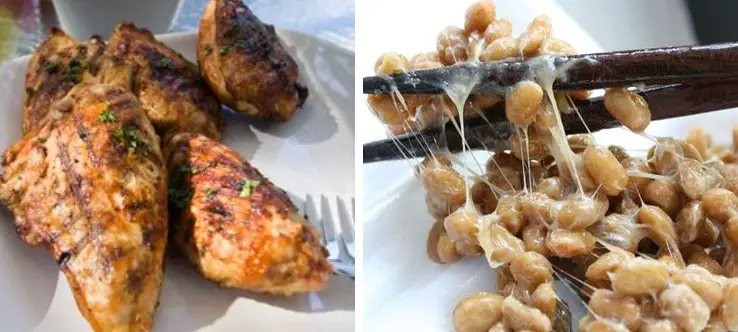
One way to become as healthy as possible is to make sure you are filling the nutritional gaps in your diet.
Since chemical-intensive farming began in the post-WW II era, topsoil in the United States and other countries has become nutrient deficient.
Minerals like magnesium, calcium, Vitamin A, manganese, copper, iodine, and more are now in short supply compared to what our grandparents received in their diets.
One of the most important minerals is Vitamin D. Vitamin D is produced in the human body after exposure to sunlight.
It is also obtained through food.
Vitamin K2 can help your body absorb and utilize Vitamin D, making it a useful co-factor vitamin when added to your daily routine.
Top Five Foods Rich in Vitamin K2
Vitamin K2 is often found in fermented foods of both dairy and plant-based types.
Seafood and animal-based foods are rich in the nutrient as well.
The following are the top five sources according to Healthline.com:
- Natto-
A fermented Japanese dish made from soybeans, natto is the highest food source of Vitamin K2 available. Always buy natto organic, since most soybeans are genetically engineered in the United States.
- Eel-
While not widely eaten, 100 grams of eel can surpass the daily total need for your recommended Vitamin K2 consumption.
- Cheeses-
Different types of cheese constitute some of the best sources of Vitamin K2, which helps your body absorb Vitamin D more readily. The amount of Vitamin K2 typically increases with each cheese’s age.
Grass-fed butter or ghee are also high quality sources among dairy products.
Some of the top Vitamin K2 sources among cheeses include:
Muenster (50 micrograms)
Camembert (34 micrograms)
Aged Gouda (32 micrograms)
Cheddar (12 micrograms)
- Beef Liver-
Beef liver can provide an entire day’s worth of key nutrients including Vitamin A, riboflavin, copper, and folate. It is also said to be the best meat source of Vitamin K2.
- Chicken-
Among non-organ meats, chicken stands out.
It contains up to five to ten times the Vitamin K2 content of beef or pork according to Healthline.
A Final Word on Vitamin K2 Supplementation and Vitamin D
Vitamin K2 should not be confused with Vitamin K1, which is found more often in dark leafy greens, vegetables, and some plant-based oils, according to WebMD.
These two vitamins are especially important because they help prevent excessive bleeding and bruising when blood vessels become injured.
In other words, they ensure healthy blood clotting within the human circulatory system.
Consuming more Vitamin K2 helps:
-Prevent the formation of plaque in the arteries
-Ensure healthier blood circulation
-Activate a protein that helps assimilate calcium for healthier bones
-Support the formation of more flexible blood vessels
For these and other reasons, I am a big fan of Vitamin K2 and Vitamin D supplements like the one shown above.
Combining these two vitamins in the same supplement quickly leads to an increase in Vitamin K2 and Vitamin D levels in the body.